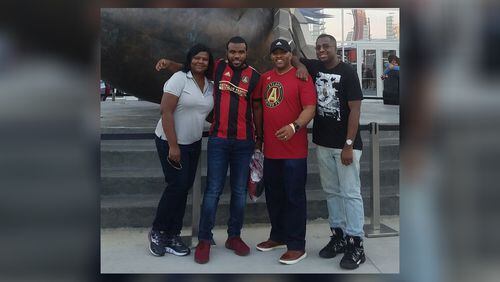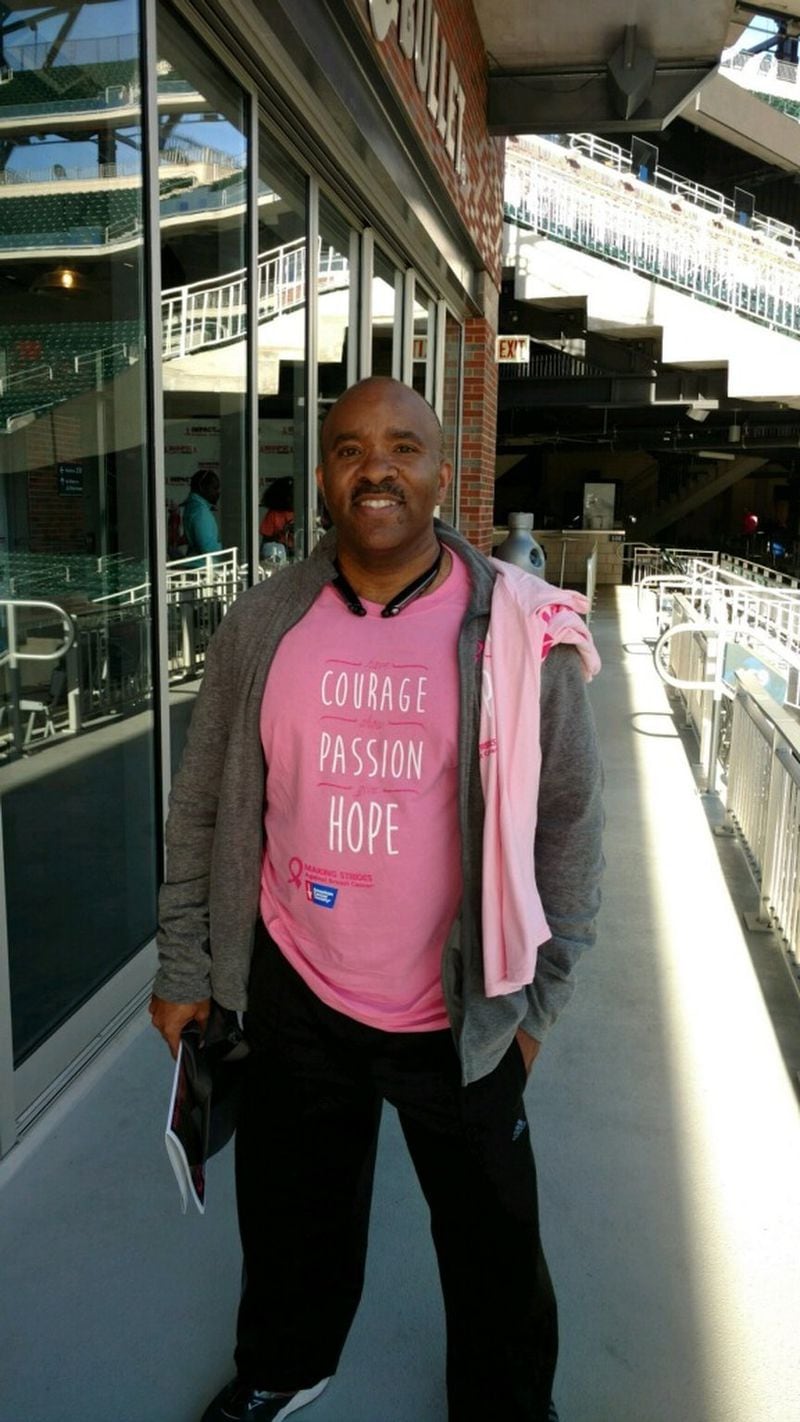Eric Dunlap has a family history of breast cancer.
His mother is a two-time survivor. His grandmother died of the disease.
Still, Dunlap never expected to hear the words, “You have breast cancer.”
He remembers holding the phone in disbelief.
After all, he considered himself healthy, never smoked. Never had a broken bone or even a cavity.
“I was shocked,” said Dunlap, a resident of Stone Mountain. “I remember thinking ‘I’m a man. How can this be?’”
Since that call 18 years ago, Dunlap, vice president of mortgage lending at the CDC Federal Credit Union, has been on a mission to educate other men about breast cancer.
“As guys, we’re very dismissive of pain,” said Dunlap, 52. “We’re just wired that way. We don’t go to the doctor and, if I hadn’t, I could have died.”
Men are also riding the pink wave during October, which is National Breast Cancer Awareness Month. Dunlap is among several metro Atlanta men competing in the American Cancer Society’s Real Men Wear Pink campaign to raise money for patient programs and service, education, research and advocacy.
Related: What breast cancer study means for women facing chemo
He also plans to participate in the 20th anniversary Making Strides Against Breast Cancer Walk of Atlanta, which will be held at SunTrust Park on Saturday.
Indeed, men can get breast cancer.
Rocker Peter Criss, the former KISS drummer, went public about his breast cancer diagnosis in 2008.
And actor Richard Roundtree, known for his role as a detective in the hit film series "Shaft," wrote about his breast cancer diagnosis in Essence magazine.
Still, it’s rare.
Roundtree admits in the 2009 piece that, when he was told he had breast cancer in 1993, he thought the doctor was “questioning my manhood because women die from this, not men.”
The American Cancer Society estimates that 2,550 new cases of invasive breast cancer will be diagnosed in men in 2018, compared to 266,120 new cases in women.
Breast cancer is about 100 times less common among white men than among white women. It is about 70 times less common among black men than black women .
Related: Man donates $10,000 to Piedmont after woman's act of kindness
“No one chooses cancer,” said Dunlap. “But you have to educate men.”
It’s so rare that there are no recommended breast screenings for men as there are for women.
“We want to to stop men from getting advanced breast cancer, just like we do women,” said Dr. John William Henson IV, chief of oncology services at Piedmont Healthcare. “The earlier you detect it, the more curable it is just by taking it out. If you ignore it, then you run the risk that it spreads. Although breast cancer is much less common in men than in women, it’s crucial that any man who notices a lump in the region of his breast remembers that they can get breast cancer too, and they should not ignore it. If you feel something, do something.”
Dr. Jane Lowe Meisel, a medical oncologist and breast cancer expert at Winship Cancer Institute of Emory University, has spent some time talking about these issues with her patients.
Related: New colorectal screening guidelines could save lives
“I think one of the challenging things about Breast Cancer Awareness Month is that there are pink ribbons everywhere and lots of discussion about mammograms and prevention, taking your health into your own hands,” she said. “These messages can be empowering for many women, but sometimes men with the disease, who may not feel fully ‘embraced’ by the movement, can feel a little isolated. I always reassure my male patients that, even though male breast cancer is rare, it does happen, and they are not alone.”
Research has shown there is an increase risk of breast cancer in men who have the BRCA 2 gene mutation, she said. She recommends BRCA gene testing for all men who are diagnosed with breast cancer — the results could benefit family members.
If you have a BRCA mutation, the women in the family may want to get tested as their risk of ovarian cancer and breast cancer would be elevated. BRCA2 mutation carriers are also at an increased risk of prostate cancer, melanoma and some other cancers, as well.
Additionally, many men who get the disease have estrogen-sensitive breast cancer, so obesity can be an issue as well.
Other risk factors include a family history of breast cancer and Klinefelter syndrome, a condition in which men have an extra X chromosome.
Dunlap was diagnosed with breast cancer in the summer of 2000.
He became concerned after he felt excruciating pain in his chest while exercising. The pain was so intense he couldn’t finish. His wife thought he might be having a heart attack. When they touched the area that hurt, they both noticed a lump.
He remembers that about a year earlier, when he was doing yard work, he noticed a spot of blood on his shirt. It came from his right nipple.
His doctor at the time told him he’d probably accidentally hurt himself working in the yard and to come back if the bleeding didn’t stop, which it did.
He now thinks the two were related and wonders what that doctor would have discovered had he done more testing or asked about his family history of breast cancer.
After the pain in his chest, Dunlap saw a different doctor. That doctor recommended a needle biopsy and discovered malignant cancerous cells.
By then, the cancer had spread to his lymph nodes. It was Stage II. He had a radical mastectomy and reconstructive surgery.
Dunlap, who is cancer free, now shares his story with other men.
He thinks about his sons, who are ages 19 and 22.
“I think about their future,” he said. “I flashback to what if I hadn’t gone in. The doctor said if I hadn’t come in, I wouldn’t be here.”
If you go:
Making Strides Against Breast Cancer of Atlanta - Walk
Registration at 7 a.m., walk at 9 a.m. Saturday
SunTrust Park
Making Strides Against Breast Cancer of Cobb County – Walk and Peachtree Qualifying Run
Registration at 7 a.m. Nov. 10
Peachtree Qualifying Run starts at 9 a.m.; walk begins at 9:05 a.m.
Fifth Third Bank Stadium, Kennesaw State University
About the Author







